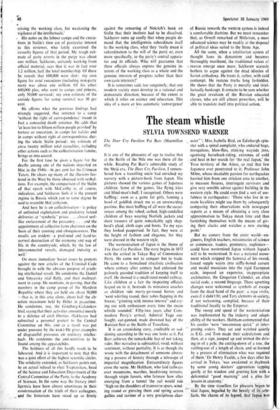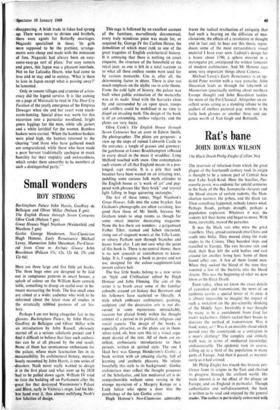The steam whistle
SYLVIA TOWNSEND WARNER
It is one of the pleasures of age to realise that at the Battle of the Nile one was there all the while. Reading Pat Barr's admirable study of the Meiji era, The Deer Cry Pavilion, I remem- bered how a travelling uncle had enriched my nursery with a picture-book from Japan. The pictures showed the various games of Japanese children. Some of the games, like flying kites and blind-man's-buff, I recognised. Others were baffling: even as a game for girls, fanning a bowl of goldfish struck me as an unrewarding pastime. But most baffling of all were the occur- rences among the robed, sashed, high-sandalled children of boys wearing'-Norfolk jackets and short trousers of quite remarkably ugly shep- herd's plaid, cloth caps and boots. To my eyes they looked pauperised. In fact, they were at the height of fashion and elegance, for they were dressed in the western style.
The westernisation of Japan is the theme of The Deer Cry Pavilion. The story begins in 1853 with the arrival in Tokyo Bay of Commodore Perry. He came not to conquer but to trade. He came to a formalised ritualistic civilisation where century after century had enforced the jealously guarded tradition of keeping itself to itself. He showed it a small-sized model railway. Like children at a fair the inspecting officials leaped on to it, bestrode its miniature coaches as children ride merry-go-round horses and 'went whirling round, their robes flapping in the breeze, "grinning with intense interest" and cry- ing out with enthusiasm every time the steam whistle sounded.' Fifty-two years after Com- modore Perry's arrival, Admiral Togo out- fought, out-gunned, made drowned hay of the Russian fleet at the Battle of Tsuschina.
It is an astonishing story, creditable or sad- dening according to the way one looks at it. Pat Barr achieves the 'remarkable feat of not taking sides. Her narrative is substantial, vivid, without sentiment, without partiality. It is as though she wrote with the detachment of someone observ- ing a process of history through a telescope of impartial magnification. Extraordinary figures cross the scene. Mr Holtham, who laid railways over mountains, marshes, headstrong torrents, through virgin forests, who foresaw how after emerging from a tunnel 'the rail would ride "high on the shoulders of transverse spurs, wind- ing round or piercing them and spring across gullies and ravines of a very precipitous char-
acter" '; Miss Isabella Bird, an Edinburgh spin- ster with a spinal complaint, who endured bugs, mosquitoes, blow-flies, stinking wayside inns, agonising horseback-riding, extremes of cold and heat in her search for 'the real Japan,' the Yesu territory of the Ainus, so real that few Japanese ever penetrated to it; Professor John Milne, whose insatiable passion for earthquakes hurried him from one stricken area to another, to measure fissures, interrogate survivors and give very sensible advice against building in the western style. He could even find a sort of use- fulness in earthquakes: 'Those who live in re- mote localities might use them by .subsequently comparing their observations with newspaper reports as a means of obtaining a very close approximation to Tokyo mean time and thus furnishing themselves with the means. of, giv- ing their clocks and watches a new starting point.'
But no corners from the outer world—en- gineers, English teachers, missionaries of science or commerce, traders, promoters, exploiters— could have westernised Japan without Japan's will to be westernised. It was a national move- ment which stripped the Samurai of his sword, forced supple waists into stiffly-boned corsets and modal musicians into the rigid European scale, imposed an expensive, inappropriate architecture, the Gregorian Calendar, an alien social code, a second lInguage. These upsetting changes were welcomed as symbols of escape from the dead hand of the past: a toga' virilis, even if it didn't fit; and Tory elements in society, if not welcoming, complied, because of their traditional loyalty to the Emperor.
The sweep and speed of the westernisation was implemented by the industry and adapt- ability of the workers. Holtham commented that his coolies 'were "uncommon quick" at inter- preting orders. They sat and watched quietly as E.G. and Tom made their calculations and then, at a sign, jumped up and mimed the driv- ing-in of a pole, the cutting-down of a tree, the rattling-out of a length of chain, and so learned by a process of elimination what was required of them.' Dr Henry Faulds, a few days after his arrival in Tokyo, 'was awakened at daybreak by some young doctors' apprentices tapping gently at his window and greeting him with a deferential "good morning" and a plea for lessons in anatomy.'
By the time travellers for pleasure began to visit Japan, beguiled by the beauty of its..arte- facts, the charm of its legend, that Japan was
-.-disappearing. A brisk trade in fakes had sprung
There were tours to shrines and brothels, -there were agents for Butterfly marriages. Nagasaki specialised in these; 'its girls were supposed to be the prettiest, arrange- ments were cheap and made with the minimum of fuss. Nagasaki had always been an easy- eome-easy-go sort of place.' For easy comers and goers, this Japan was a pleasant interlude. Not so for Lafcadio Hearn, who had come to love and to stay and to outstay. 'What is there to love in Japan except what is passing away?' he lamented.
Only in remote villages and crannies of aristo- cracy did the legend survive. It is -like coming on a page of Murasaki to read in The Deer Cry Pavilion of the yearly emergence of the Empress Dowager when she and her court went mush- room-hunting. Special dress was worn for this excursion into a particular woodland; bright green leggings for the men; white silk- gaiters and a white kerchief for the women. Bamboo baskets were carried. 'When the bamboo baskets were piled high, the hunters returned to the -clearing "and those who have gathered much are congratulated, while those who have made a poor harvest traditionally apologise in mock humility for their stupidity and awkwardness, which render them unworthy to be members of such a distinguished party."'



































 Previous page
Previous page